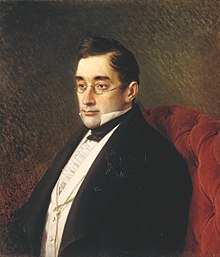Aleksander Griboyedov
| Alexander Griboyedov | |
|---|---|

Portrait by Ivan Kramskoi
|
|
| Russian Ambassador to Iran | |
|
In office 1828 – 1829 |
|
| Monarch | Nicholas I of Russia |
| Personal details | |
| Born |
Alexander Sergeyevich Griboyedov 15 January 1795 Moscow, Russian Empire |
| Died | 11 February 1829 (aged 34) Tehran, Qajar Iran |
| Resting place | Tiflis, Russian Empire (present-day Georgia) |
| Nationality | Russian |
| Alma mater | Moscow University |
| Occupation | Diplomat, Playwright, Poet, and Composer |
| Signature |  |
Alexander Sergeyevich Griboyedov (Russian: Алекса́ндр Серге́евич Грибое́дов, Aleksándr Sergeyevich Griboyedov or Sergéevich Griboédov; 15 January 1795 – 11 February 1829), formerly romanized as Alexander Sergueevich Griboyedoff, was a Russian diplomat, playwright, poet, and composer. He is recognized as homo unius libri, a writer of one book, whose fame rests on the verse comedy Woe from Wit or The Woes of Wit. He was Russia's ambassador to Qajar Persia, where he and all the embassy staff were massacred by an angry mob as a result of the rampant anti-Russian sentiment that existed through Russia's imposing of the Treaty of Gulistan (1813) and Treaty of Turkmenchay (1828), which had forcefully ratified for Persia's ceding of its northern territories comprising Transcaucasia and parts of the North Caucasus. Griboyedov had played a pivotal role in the ratification of the latter treaty.
Born in Moscow, Griboyedov studied at Moscow University from 1810 to 1812. He then obtained a commission in a hussar regiment, which he resigned in 1816. The next year, he entered the civil service. In 1818 he was appointed secretary of the Russian legation in Persia, and transferred to Georgia.
...
Wikipedia
